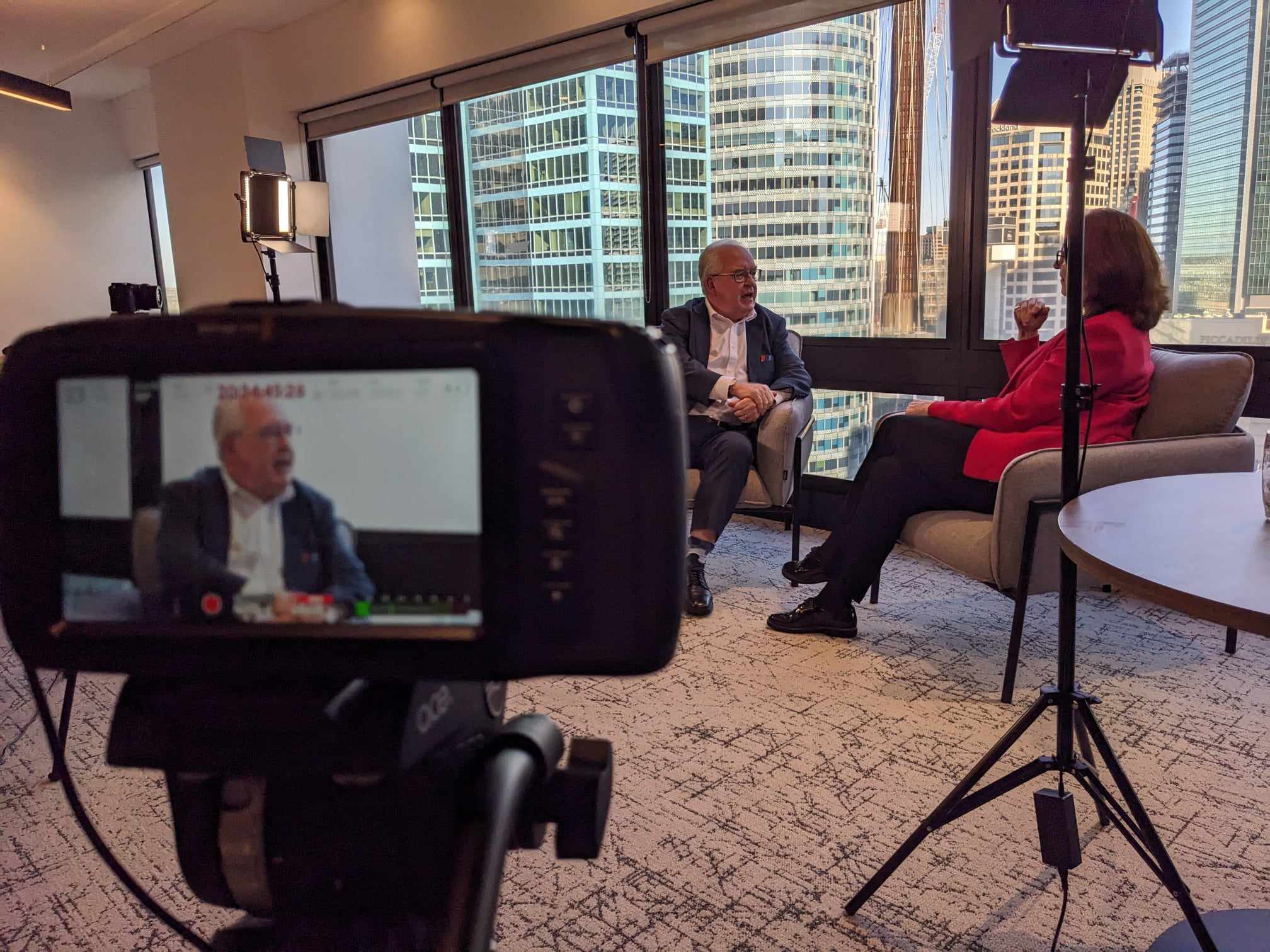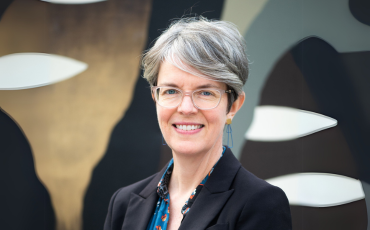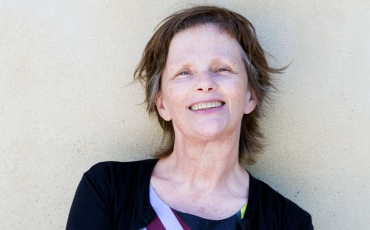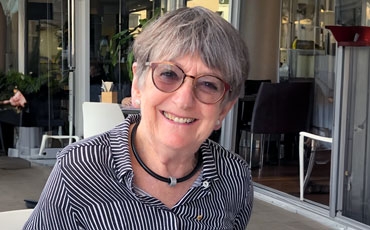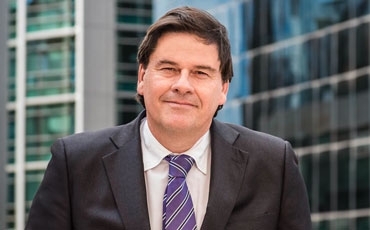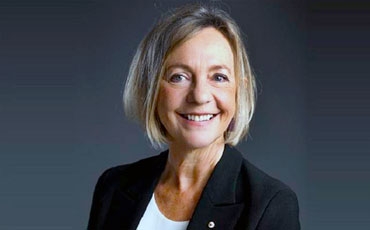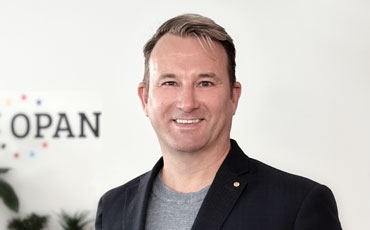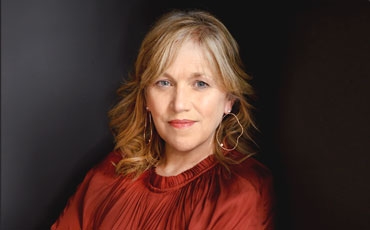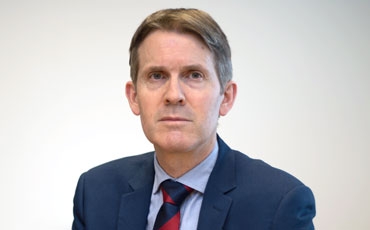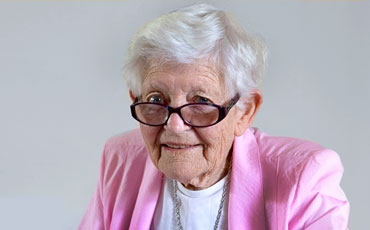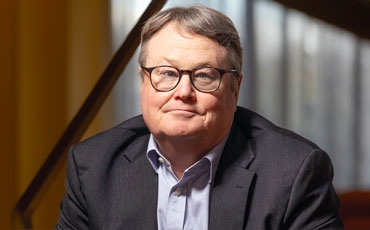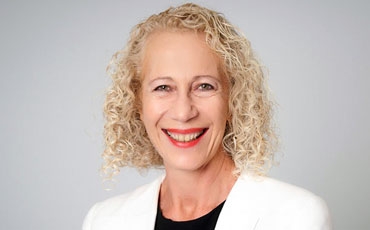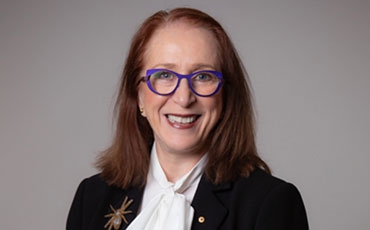About
In the interview series 'Let's Talk Ageing', the Age Discrimination Commissioner, Robert Fitzgerald AM, sits down with prominent Australians and thought leaders to discuss ageing positively and the human rights challenges facing older people.
The Q&As will come in a variety of formats, including written responses and recorded videos.
Episode list
Episode summary
Latest Episode: Liz Neville
In our next Let’s Talk Ageing episode, we hear from Director of the Australian Institute of Family Studies (AIFS), Liz Neville.
Liz is passionate about the broad and diverse definitions of families and the contributions older people make to family life. For her, this means being part of the “sandwich generation,” caring for an elderly mother from a distance, while juggling the demands of work and raising teenage boys.
She said AIFS welcomes diverse experiences and perspectives on the topics, trends and issues affecting contemporary Australian families, stating: “Old age spans a wide spectrum, including young-old, middle-old and old-old. Each stage has its unique benefits and challenges”. Read more from Liz below.
Episode 11: Dr Catherine Barrett
In our February Let’s Talk Ageing episode, we hear from Dr Catherine Barrett, CEO of Celebrate Ageing, a charity combating ageism and building respect for older people. Catherine is a Trailblazer of positive ageing, a researcher, collaborator and founder of The Kindness Pandemic, voted the world’s most uplifting Facebook group in the world in 2021.
Catherine’s research and projects have often had a gendered lens and Catherine is now working on the first gender analysis and planning tool for elder abuse services. A Gender Lens for Elder Abuse identifies key elements of gender specific approaches when providing elder abuse services. The tool can be applied to the experiences of older men and trans and gender diverse people. It will be officially launched by Age Discrimination Commissioner Robert Fitzgerald AM in April.
Catherine sees ageing as a privilege and celebrating it something she works at “every single day”. Read more in Catherine’s Let’s Talk Ageing contribution below.
Episode 10: Ms Dorothy Hoddinott AO
In our first Let’s Talk Ageing episode for 2025, we hear from human rights and refugee advocate, and educator, Ms Dorothy Hoddinott.
Awarded the Australian Human Rights Medal in 2014 for her work with refugee and asylum seeker young people, Ms Hoddinott continues to pursue this advocacy work as part of her active volunteering. She sees many sides to ageing, including being able to put to use your lifetime accumulation of knowledge and experience, but without the “luxury of a lifetime ahead of you”.
Ms Hoddinott adds: “I think the key challenges for people as they get older include loss of agency and a sense of purpose in life... I may need to be dependent on others for the last years of my life. Until then, I plan on living life to the full.”
Episode 9: Innes Willox AM
In our final Let’s Talk Ageing episode for 2024, Age Discrimination Commissioner Robert Fitzgerald AM sits down with the Australian Industry Group’s Chief Executive, Innes Willox AM about some of the challenges and opportunities of ageing in Australia. Reflecting that he is “now closer to the end of work than the start”, Mr Willox speaks about growing awareness of the value of older people in Australian workplaces.
He shares insights into how his personal perspective is changing at the same time that there is a national mindset shift, driven by necessity and commonsense, to keep mature workers in the workplace: “Ageing necessarily gives you wisdom, it gives you a whole of patience but most importantly, it gives you perspective."
Episode 8: Professor Marian Baird AO FASSA
In this episode we hear from University of Sydney Business School’s Professor of Gender and Employment Relations, Marian Baird AO FASSA.
Professor Baird explains how life’s challenges intensify as people age, particularly for women, in an era she calls ‘the age of ageing’. Having co-authored a book about the multigenerational workforce, Professor Baird is keen to highlight the areas organisations can focus on to support older workers: “The way we work, and care need to adapt”, she said.
Episode 7: Craig Gear OAM
In this month’s episode we hear from Older Person’s Advocacy Network (OPAN) CEO Craig Gear OAM.
Mr Gear explains how his grandmothers’ insights into life and ageing led to his career in nursing and ultimately his current role as OPAN’s CEO. He strongly believes working with older people is key. OPAN advocates like Val Fell, whom he calls ‘the boss,’ push him to see the change that is possible when lived experience voices are at the advisory table.
Episode 6: Pat Sparrow
To mark the International Day of Older Persons, Age Discrimination Commissioner Robert Fitzgerald AM sits down with COTA Australia CEO Pat Sparrow.
COTA's role is to promote, improve and protect the wellbeing of older people in Australia. According to Ms Sparrow, Australia is currently not valuing its elders "as much as we should".
In their wide-ranging chat, Ms Sparrow discusses how she tackles her own ageing, how ageism is at the core of most challenges facing older people, and what she believes Australia needs to do to address their needs.
Episode 5: Dr John Chesterman
In the fifth of our series, we hear from Dr John Chesterman, Queensland Public Advocate and the Australian Human Rights Commission’s Expert Adviser for the report, Empowering futures: A national survey on the understanding and use of financial enduring powers of attorney.
In this interview, Dr Chesterman explains he has long advocated to close the safeguarding gap for adults at risk in the community, including the use of adult safeguarding networks to facilitate awareness and grow outreach to adults who are at risk of harms such as elder abuse. “I also encourage people more generally to reach out to people who are isolated, and to devise ways of providing opportunities for marginalised people to stay connected with others.”
Episode 4: Mrs Val Fell
In the fourth of our series, we hear from Mrs Val Fell, a member of the Australian Government's Council of Elders and the Older Person's Advocacy Network Older Person's Reference Group.
In this interview, Mrs Fell explains there are many challenges older people face, but at 95 years of age she is still advocating for an aged care system that is fit for purpose.
Episode 3: Mr Murray Coates
In the third instalment of our series, we hear from community transport campaigner and advocate for older people, Mr Murray Coates.
Mr Coates is Chief Executive Officer of the Australian Community Transport Association (ACTA).
In his interview, Mr Coates describes how many older people are socially isolated, which results in a lack of autonomy and independence. He says community transport is vital to connecting those people to the wider world. "We need to empower older Australians and give them as much control over their life as they want."
Episode 2: Dr Marlene Krasovitsky
In the second instalment of our series, we hear from esteemed advocate and campaigner Dr Marlene Krasovitsky.
Dr Krasovitsky is a board member of the grassroots anti-ageism movement EveryAGE Counts, and a consultant to the World Health Organisation's Global Campaign to Combat Ageism.
In her interview, Dr Krasovitsky discusses the "pervasive and highly tolerated" nature of ageism and the barriers it presents to older Australians, and the importance of public awareness to challenge harmful attitudes, stereotypes, and discrimination.
Episode 1: Em. Prof. Rosalind Croucher AM
In the first interview of this series, Age Discrimination Commissioner Robert Fitzgerald AM talks with outgoing President of the Australian Human Rights Commission, Emeritus Professor Rosalind Croucher AM, about ageing positively and some of the challenges older persons face from a human rights perspective.
Episode transcripts
-
Latest Episode: Liz Neville
Question:
What does getting older mean to you, and why?
Liz Neville:
As the Director of the Australian Institute of Family Studies (AIFS), I am interested in the role and contribution of older people to family life. This has always been a focus for AIFS; recently, I spoke to Don Edgar, the first AIFS Director, who is now 88 years old. Don laid the foundations for a broad and progressive conception of families, and is passionate about research into older people, including positive ageing. I look forward to continuing this important work. On a personal level, I am part of the ‘sandwich generation’ – caring for my elderly mother from a distance, while juggling the demands of work and raising teenage boys.
Question:
What do you see are the key challenges people face as they get older?
Liz Neville:
Old age spans a wide spectrum, including young-old, middle-old and old-old. Each stage has its unique benefits and challenges. When it comes to families, there are many issues and dynamics for older people to navigate. Whether it’s caring for grandchildren or other children in a kinship network, or supporting young adults who are increasingly living with their parents, there are growing expectations on older family members. More older couples are experiencing relationship breakdown (see the rise in ‘grey divorce’) and, later again, people may be worried about the extent of familial support when they reach the old-old stage.
Question:
Tell us about your work and what you’ve been doing to address these challenges?
Liz Neville:
AIFS has a long track record of building the evidence base to support healthy ageing. Part of this is exploring the extent of older people’s contribution to family functioning – such as our study showing two in five grandparents of children under 13 provide childcare, and another study revealing kinship carers are likely to be older, many of them First Nations People. We also explore insidious, but surprisingly common, issues impacting older people – like our landmark study showing 1 in 6 older people living in the community experienced abuse and mistreatment. This, and our broader research on the abuse of older people in Australia, will be critical to informing the development of the government’s next Consultation draft of the National Plan to End the Abuse and Mistreatment of Older People 2024-2034.
Question:
How can others get involved or support this work?
Liz Neville:
AIFS is currently developing a new Strategic Research Agenda, to guide our work, and position our research to better inform government policies and programs over the next 3 to 5 years. To support this process, we welcome diverse experiences and perspectives on the priority topics, critical trends and emerging issues affecting contemporary Australian families. Views about older people in Australia, and family issues across the life course, are firmly within scope – as is the interconnectedness of different generations within families. If you would like to contribute to this process and/or discuss the potential for partnership and collaboration, please visit AIFS Strategic Research Agenda.
-
Episode 11: Dr Catherine Barrett
Question:
What does getting older mean to you, and why?
Dr Catherine Barrett:
I believe ageing is a privilege. My 18-year-old sister died when I was 17. I was heartbroken – and left with a strong sense of my own mortality and the preciousness of life. I believe that each day is a gift. It’s not that I effortlessly celebrate life and my ageing – rather, I work hard at it. There are so many ‘anti-ageing’ messages that can derail the efforts to value our own ageing. Celebrate Ageing is not just about the work I do – it’s the life I live. So, I work at it; every single day.
Question:
What do you see are the key challenges people face as they get older?
Dr Catherine Barrett:
I think one of the most significant challenges for older people is internalised ageism. We know this form of ageism can diminish health and wellbeing and decrease life expectancy. But ageism is so deeply entrenched in our society that many of us don’t see it in ourselves. This makes it particularly toxic. When older people protect themselves against ageism – the effects of ageism are significantly diminished. We all need to understand that ageism is not ‘other’, it’s us. All of us.
Question:
Tell us about your work and what you’ve been doing to address these challenges?
Dr Catherine Barrett:
The work of Celebrate Ageing Ltd is building a national network of leaders passionate about combating ageism and promoting respect for older people. We test innovations that bridge the evidence-culture gap and utilise art and narrative based approaches to engage critical mass for change. In 2023 we established a program called The Margins, to raise awareness of the relational nature of marginalisation and to ensure our work reaches all older people. We also believe in the power of older people to lead change, and we offer Fellowships to older people through our Elder Leadership Academy.
Question:
How can others get involved or support this work?
Dr Catherine Barrett:
Anyone who is interested in following our work can go to our website celebrateageing.com and sign up for our newsletter. Community and service leaders can check out the Facilitator’s Kits on our Education page. Anyone who is interested in supporting the work of our charity is welcome to make contact with me.
-
Episode 10: Dorothy Hoddinott AO
Question:
What does getting older mean to you, and why?
Ms Dorothy Hoddinott:
Getting older comes as rather a surprise: you are still yourself but without the luxury of a lifetime ahead of you, the future no longer a long-term project; there is, however, more time for yourself and developing your interests, and putting to use a lifetime’s accumulation of knowledge and experience. And there is the benefit of not having to go to work anymore. I don’t see myself radically changing my life, but I need to be realistic about its finiteness. It will come to end, I will die, I may need to be dependent on others for the last years of my life. Until then, I plan on living life to the full.
Question:
What do you see are the key challenges people face as they get older?
Ms Dorothy Hoddinott:
Physical and possible cognitive decline aside, I think the key challenges for people as they get older include loss of agency and a sense of purpose in life. This can be particularly acute immediately post-retirement, when people may struggle with loss of self-image and authority, and how to use their time effectively. Downsizing or moving away into a new community can be difficult and problematic. Our society tends to be dismissive of older people, although most of us will get old. Poverty and homelessness, particularly for older women, who may not have adequate superannuation, are issues that need government remedy.
Question:
Tell us about your work and what you’ve been doing to address these challenges?
Ms Dorothy Hoddinott:
Since my retirement, I have continued to work in refugee and human rights advocacy, and support for the arts. I am a pro-chancellor at the University of Sydney, which mainly involves presiding at graduation ceremonies, and am on the Council of the Sydney Symphony Orchestra. I appreciate this is not for everyone, but active involvement in the community is a good way to retain a sense of purpose and engagement in one’s life and continuing to have a voice in the wider society.
Question:
How can others get involved or support this work?
Ms Dorothy Hoddinott:
Becoming actively involved in volunteering is not difficult. I would suggest following your interests and using the expertise and skills you have gained throughout your life: helping out at the local primary school, volunteering at a museum or a gallery, joining an organisation like the CWA or the Asylum Seeker Centre, getting involved in your local church, joining a choir or a men’s shed. There are a lot of possibilities to take you out of the house and out of yourself.
-
Episode 9: Innes Willox AM
Robert Fitzgerald AM, Age Discrimination Commissioner
Hi, I'm Robert Fitzgerald. I'm the Age Discrimination Commissioner with the Australian Human Rights Commission and welcome to another episode of Let's Talk Ageing. These series are about having conversations with some of Australia's major thought leaders particularly in relation to Ageing in Australia, the issues that are important to older people and the way in which, we as a society, need to respond to those challenges and opportunities for older people to live meaningful lives. We hope that the issues that we're raising are important to you and we hope that you can work with us on trying to advance the answers to those challenging issues.
Today we're delighted to be joined by Innes Willox, the CEO of the AI Group, one of Australia's leading industrial relations groups.
Innes Willox AM, Ai Group CEO
Thanks so much thanks for having me.
Robert Fitzgerald AM, Age Discrimination Commissioner
The AI Group has been around a long time, does a lot of great work but you've got this notion of improving this or increasing the success of business to benefit all Australians, what do you think that means in terms of particularly older people and older workers?
Innes Willox AM, Ai Group CEO
Well Robert, the Australian Industry Group or AI Group as we know, has been around in one form or another now for just over 150 years so that's pretty old itself. We've been around and we started in Sydney with a couple of Iron Work workers and their foundries. Then it's expanded from there through the generations now to cover a whole big wide range of the economy, everything from manufacturing now through to the care sector including the age care sector, childcare, disability and everything in between, so we cover a big wide range of the economy.
Industrial relations is at our core. It’s not all that we do, but it's very much at our core so we're involved in a lot of the conversations about how the workforce is made up and how the workforce operates. What we talk about as an organisation is how we can make Australia a better place, how can Australian industry and that broad swathe of industry, make Australia more prosperous and Australians more prosperous in a sustainable way?
You know prosperity will only come if we do drive a whole range of things including productivity and sort of really strong sustainable economic outcomes for all and, you know. So, we work across the board, we work a lot with unions, we work with government, we work with regulators to try to get the best outcome.
We're quite moderate, well we like to think we're quite moderate, in the way we approach things but sometimes we have to be forceful to get outcomes which we think in the long run, and we always think of the long run, will make Australia a better place.
Robert Fitzgerald AM, Age Discrimination Commissioner
I want to come to some of the issues particularly around older Australians who want to enter the workforce, mature age workers, but your own reflections about yourself and ageing - how do you approach ageing for yourself?
Innes Willox AM, Ai Group CEO
I feel it every day. Well, I'm sort of now getting to an age where, as I like to say, I'm closer to the end of work than at the start, I’m way closer towards the end and so you know both within my own mind and with my wife in particular I'm having, we’re having conversations around well what does the next bit of life look like.
But you know ageing is I think a process - the old saying if you knew now at an age you what you could if you had known that at 25 you would be a much better person and in a much better place so I think ageing necessarily gives you wisdom, gives you a whole lot of patience but most importantly it gives you perspective.
I recently did a whole range of testing just as part of an exercise with our leadership group at the Australian Industry Group and the number one strength that I apparently have is context. I always want the context and what happens and why, and I think you as you get older that becomes more important.
Robert Fitzgerald AM, Age Discrimination Commissioner
Well talking about context, you know the demography Australia is changing. The economic need to have older workers, mature age workers, is growing, and of course older people do want to continue to work a little bit longer. But what are the sort of challenges do you think that’s posing for the Australian economy and for you know the industries that you represent?
Innes Willox AM, Ai Group CEO
So, you're going to bear with me a little bit on this this question because we talk about our current position and our future in a series of Ds, the letter D.
So, there is Disruption - we live we live in an increasingly disrupted world.
Diversification- business is looking to diversify products and markets
Decarbonisation - the big issue we’re trying to be a cleaner economy.
Debt - we live in a time of debt of really strong debt.
Demography - because demography matters, it always has, and it always will. There have been books written, many books written about demography, but the fact is that we are both ageing and shifting - how we live and where we live. We're living longer. You know we have recently seen the retirement age start to inch up and we have to do two things - we have to take account as a workforce, that a national workforce I mean, that we that we are getting older; and we have to provision for that older cohort of the population which is growing.
So it is shifting how we how we work, in terms of trying to keep people in the workplace for longer. Which to be quite blunt Robert, business overall, sweeping generality, hasn’t been great at in the past. There has been this notion of if you reach 50 (years), perhaps that's it, you know, if your job goes you know you're made redundant, your place of work shuts down. Getting another job has been incredibly difficult. So, we're in the middle, I think, of a of a major national mindset shift here, which is driven by necessity as well as by commonsense. We have to find ways to keep, I don't like to say older, I like to say more mature workers in the workplace.
Now there's a couple of ways that some of the trends are really helping with this: work from home or the notion of hybrid work or blended work is really helpful, and the fact that we have now that greater connectivity.
So, part of the challenge we have is that as we're getting older the other D that I didn't mention I wanted to link them in together, Demography and Digitalisation, is that we have to retrain reskill and get the older workforce in a better position to participate.
Robert Fitzgerald AM, Age Discrimination Commissioner
Do you think your employer groups the groups that you represent have come to the realization that they need to be employing older workers into the future, has that sort of dawned on them?
Innes Willox AM, Ai Group CEO
It's sinking in, it's sinking in. The realisation is there. It's now how do we do it, and that's where the digitalisation is important.
So, work from home you could say is part of digitalisation, but 80% of the jobs, now and in the future, have a digital component. That doesn't mean we all have to become computer coders and IT sort of Geeks or experts, but there has to be some digital awareness and so we have to go through a process of assisting people to retrain. That’s where either in work learning, work-integrated learning as it’s known, or external services providers are going to be so important to helping people to reskill and that’s where the big challenge lies.
So yes, business is adapting to the idea that we have to do this now and how best to we equip people to participate in this.
Robert Fitzgerald AM, Age Discrimination Commissioner
Okay thanks very much Innes, that’s terrific.
Looking forward to seeing you on further episodes of Let's Talk Ageing, and as I always say may you age well.
-
Episode 8: Professor Marian Baird AO
Question:
Who is an older or younger person who has had an impact on your life and how?
Professor Marian Baird:
One older person who has truly inspired me is women’s social policy advocate Marie Coleman AO PSM. I first met Marie over 25 years ago when I was researching women’s access to paid parental leave in Australia. Marie, now aged 92, is a clear-minded person with years of experience in developing and evaluating public policy. She is a strong feminist and was very influential in the debates leading up to the introduction of Australia’s paid parental leave scheme. We worked together on a number of projects. I have always found Marie’s zest for life and activism inspiring, plus she has a great sense of humour and compassion.
Question:
What do you see are the key challenges people face as they get older?
Professor Marian Baird:
I see challenges and also opportunities for people as they age. Managing health, work and caring can be challenging. I see these issues coming into my research and into my personal experiences, and understand more and more the concerns about health and wellbeing people have for themselves and for the ones for whom they care. Caring and working are intertwined for many older women today and they intensify as we age. Coupled with this are the financial costs of living longer, such as medical and housing costs, which can be very worrying. Reflecting on one’s own life also becomes more pronounced, as does the desire to contribute more to family and friends.
Question:
Tell us about the research you’ve been doing to address these challenges?
Professor Marian Baird:
As the population ages so too does the workforce and we have been researching how older workers navigate their careers, and how organisations accommodate (or not) the older worker. Our focus has been on older women as they constitute the largest growth in Australia’s workforce over the past two decades and they contribute enormously to Australia’s economy. They also provide the majority of care to older relatives and to grandchildren. Our research highlights the areas organisations can focus on for older workers, which include working time flexibility, career opportunities and improved knowledge exchange.
Question:
How can others get involved or support this work?
Professor Marian Baird:
The first way is to read our new book! It is called The Multigenerational Workforce: Managing Age and Gender at Work | SpringerLink. In it we provide many examples of how managers and workers can improve our workplaces for the benefit of older and younger workers, and for the organisation as a whole.
The second way is to be aware of the challenges of ageing and contribute to public debates and enquiries. The third way is to support all those people who help and support our most frail and aged members of the community.
We have to recognise that we are living in what I am calling ‘the age of ageing’ and that the way we work, and care need to adapt.
-
Episode 7: Craig Gear OAM
Question:
Who is an older or younger person who has had an impact on your life and how?
Mr Craig Gear:
Like many, but not all, I have had the privilege of having both my grandmothers in my early life - that gave me insights, love, care and fierce guidance. They taught me respect, living your values and how to laugh. Their encouragement led me to nursing and citizen advocacy.
The person who now carries on their legacy is Val Fell – my friend and mentor (and whom I call ‘the boss’). 95 years of wisdom in 5 feet of height. Val pushes me to see the change you can make when you bring lived experience voices to the table.
Question:
What do you see are the key challenges people face as they get older?
Mr Craig Gear:
The main issues for older people are being dismissed, ignored and having their agency removed.
Older people have made their own decisions all their life and suddenly as they age, there is a stripping of human rights and assumption of legal capacity.
It’s deeply rooted in the pernicious effects of ageism. It’s wrong and treats older people as ‘the other’ and a burden. It leads to less services for older people - services which should be based on their wishes, preferences and needs.
It risks, and results in abuse of older people and is a scourge on Australian society.
The solution – older people recognising and exercising their human rights - forcefully and unapologetically. That’s the way we eliminate ageism.
Question:
Tell us about OPAN and what it is doing to address these challenges?
Mr Craig Gear:
OPAN is a national network of advocacy organisations dedicated to improving people’s access to safe, high-quality aged care.
Our nine state and territory member organisations delivered more than 44,000 cases of information and advocacy support to older people and their families in the last financial year.
At a systemic level, we raise the voices of older people with government, aged care providers and sector stakeholders - challenging ageist stereotypes to advance reform.
The qualitative and quantitative data we gather through our individual advocacy work enables us to identify emerging trends and barriers for people who are seeking or receiving government-funded aged care.
Question:
How can others get involved or support this work?
Mr Craig Gear:
OPAN established the National Older Persons Reference group in 2020 to hear from, and engage with, a diverse range of older people across Australia.
This includes people living with dementia, people living with disability, people living with mental illness, LGBQTI+ people, people living in rural and remote Australia, people living in residential care, people living with rare and/or chronic disease, Forgotten Australians, Aboriginal people, and people from culturally, ethnically, and linguistically diverse backgrounds.
To broaden the input of people from minority, isolated or diverse groups, OPAN has also established a Community Voices Register of people with expertise in specific areas of ageing.
If you want to be a citizen advocate for the human rights of older people join our community voices by emailing policy@opan.org.au or call 0480 683 974.
-
Episode 6: Pat Sparrow
Robert Fitzgerald – Age Discrimination Commissioner
Hi, I'm Robert Fitzgerald. I'm the Age Discrimination Commissioner with the Australian Human Rights Commission.
And today I'm pleased you're able to join us on this next episode of our series, Let's Talk Ageing.
These are a series of conversations with Australia's thought leaders in relation to older people and the ageing of Australia and raising many issues, challenges, and also celebrating the work that we're doing in Australia for older people.
Today, I'm especially pleased to be able to welcome Pat Sparrow, who's the CEO of COTA Australia. That's Council of the Ageing.
So welcome, Pat.
Pat Sparrow – COTA Australia CEO
Thank you for having me on the series.
I think it's a really important series and particularly on International Day of Older Persons.
Robert Fitzgerald – Age Discrimination Commissioner
So let's start with that, Pat.
The International Day of Older Persons is a day in which we celebrate older people right throughout the world.
But from your work in COTA, and your work generally, why do we value older people and why is this day such an important day?
Pat Sparrow – COTA Australia CEO
I think it's an important day because we need to make sure that we do value older people, and I think we don't think about it very consciously sometimes.
And I think days like an Older Person's Day actually bring it to the fore for the community, for all of us who are working to make sure that we are thinking about older people.
I think we do have issues in the country where we don't always think about older people, and that's what we need to really try and start to address.
Robert Fitzgerald – Age Discrimination Commissioner
And do you think Australia actually values older people?
Pat Sparrow – COTA Australia CEO
Not as much as I think we should. I think, like most countries, we don't think about it.
We don't think about ageism and we see older people in a particular way.
And I think we need to shift that.
Robert Fitzgerald – Age Discrimination Commissioner
So, before we look at some of the challenges, how do you sort of personally approach ageing for yourself and for your family members?
Pat Sparrow – COTA Australia CEO
Yeah, well, I mean, and that's a thing. We are all ageing. And I guess I'm approaching it the best way I know how.
But I'm conscious that some of the things that I do actually indicate the internalised ageism that people have. So, I still dye my hair, for example, because I've been told sometime in my youth that people won't listen to a grey-haired old lady.
So, you know, I think there are those things, but I'm trying to tackle it with grace and with style, which is what I'd like to do. And I think I saw my mother do that, my older sisters doing that. And actually being who they are.
And I do feel as I've got older that I'm more me than I've ever been at any time in my life. And I think it's important that we do that and we embrace it and that we are looking at the opportunities, the things that I still want to be able to do, as well as some of the challenges we have facing.
Robert Fitzgerald – Age Discrimination Commissioner
What are some of the key challenges for older people that COTA is currently working on?
Pat Sparrow – COTA Australia CEO
Well, look, we're working across, we work for anyone over the age of 50, across all of the various things that might impact on a person's life.
So we're active in the health space and the employment space, in aged care, in retirement incomes, and there's a lot of things happening in all of those areas. But one of the things that I've really kind of come to understand in my role is that ageism is actually at the core, core of many of the challenges that we're addressing across them.
And so COTA has started to be much more active in talking about ageism, calling ageism out, whether it's that internalised ageism, but also what we see a lot in the work we do is benevolent ageism. In care settings, the way health and aged care interacts and treats older people through to discrimination, that is, more in employment, where we see recruiters not wanting to apply or employ someone over the age of 50.
So we are trying to raise those issues and to look at what are the structural, legislative, regulatory changes that are needed. So we want to do the awareness raising, but what are the things that we can then do structurally to make sure that ageism can be managed.
Robert Fitzgerald – Age Discrimination Commissioner
So in your discussions with the government at the moment, what would be the two or three key issues amongst all of those that stand out for you?
Pat Sparrow – COTA Australia CEO
The two things that are really, obvious at the moment that are really ongoing, things like aged care reform. And the thing that we're really pushing is that we get a new act that's based, a rights-based act, because it's shocking to think that older people don't have rights in aged care.
So we want to make sure that that happens and that we get that right and that people are respected and valued and supported to make their own decisions, rather than having people make decisions for them.
The other one is in retirement incomes. Government's doing quite a lot of reform around retirement incomes. And again, we're looking at how do we make sure, in the way that those reforms roll out, that older people can have a good retirement, do the things that they want to do in retirement and continue to be financially sort of able to live the life they want to live. And that's, you know, that's difficult.
We know the cost of living is affecting many people, but those are the two that are really hot at the moment.
Robert Fitzgerald – Age Discrimination Commissioner
And do you feel you're getting good hearing in the political landscape?
Pat Sparrow – COTA Australia CEO
Yes, I think we are. One of the things that we would advocate for, though, across all of the things that we're doing is that we think there needs to be a strategy for an ageing Australia. We think that what happens at the moment, there's some good things that happen, some not-so good things happen, but happens in silos in particular, in particular portfolios or particular areas.
What we'd like to see government do is take a much more overarching look because the demographics tell us we're going to have many more older people.
So we'd like to see a much broader look across. What does government need to do to make sure that we can have an ageing Australia and people can contribute to that society.
Robert Fitzgerald – Age Discrimination Commissioner
And if people want to get engaged in these conversations, these issues and the work of COTA, how could they best do that?
Pat Sparrow – COTA Australia CEO
Look, you can be a supporter for COTA. You can come to our website, COTA.org.au
and sign up to be a supporter. And we do with everything that we do, we try and make sure that we're raising the voice of older people directly.
So we do a lot of engagement, a lot of work. We recently submitted to the menopause inquiry, for example. We held focus groups with older women about their experiences.
We'll do surveys on particular topics. So it is an opportunity for you to inform our advocacy and to have your voice heard with Government.
Robert Fitzgerald – Age Discrimination Commissioner
That's a great way to finish.
Thanks very much, Pat, and thank you for being part of the Let's Talk Ageing series.
And for everyone out there, may you age well.
-
Episode 5: Dr John Chesterman
Question:
Who is an older or younger person who has had an impact on your life and how?
Dr John Chesterman:
I had childhood asthma when I was young. I recall, at about the age of 6, spending time with an older family friend, a man named Roy. He also had breathing difficulties. I recall walking on the beach with him as he told me about his coping mechanisms, which included remaining calm, not panicking, and trying not to think too much about breathing. I also recall his sense of humour, which was a good way of diverting my attention away from breathing. Those interactions with Roy have stayed with me for decades, and were a part of shaping who I am.
Question:
What do you see are the key challenges people face as they get older?
Dr John Chesterman:
There are some general challenges facing people as they age, which include the limiting stereotypes about ageing and the risk generally of being ‘unseen’ in the community. I recall the story of an older woman who took to waving a fifty dollar note in a store in the hope that someone would see that she was waiting to be served. There are also specific and well-documented risks associated with ageing, such as social isolation and loneliness, and of course the risk of elder abuse.
Question:
Tell us about the work you’ve been doing as Public Advocate in Queensland (and prior) to address these challenges?
Dr John Chesterman:
I have long sought to address the ‘safeguarding gap’ that occurs when adults are at risk in the general community. I completed a Churchill Fellowship report on this topic in 2013. One of the reports that I have released in my time as Queensland Public Advocate is a two-volume report on Adult Safeguarding in Queensland. Among other things, this report calls for the creation of an Adult Safeguarding Commissioner in Queensland, and echoes some of the key adult safeguarding reforms called for by the Australian Law Reform Commission in its 2017 report Elder Abuse – A National Legal Response. I am also a strong advocate for harmonised state and territory financial enduring powers of attorney laws and have released a ‘model law’ in the hope of prompting reform on this topic.
Question:
How can others get involved or support this work?
Dr John Chesterman:
I encourage people to read my report and the ALRC report, and to ask what their jurisdiction can do to improve the way that it works to prevent and respond to elder abuse. I also encourage people more generally to reach out to people who are isolated, and to devise ways of providing opportunities for marginalised people to stay connected with others. One reform idea that I included in my safeguarding report concerned the proposed creation of Adult Safeguarding Networks throughout Queensland. The idea there is that these networks, among other things, would facilitate greater local awareness of, and outreach potential to, adults who are at risk of harms such as elder abuse.
-
Episode 4: Mrs Val Fell
Question
What does getting older mean to you, and why?
Mrs Val Fell
Getting older means that time to advocate for improvements in the aged care system is getting shorter. Now is the time to pass into legislation an Australian Human Rights Act to establish the foundation of an Aged Care Act, based on the needs of people in the system. The former will make the rules and regulations of the latter enforceable.
Currently for me, getting older means joining the queues; for an assessment, list of services available, or names of providers and funds.
At 95 years of age time is running out for me to advocate for the system to be fit for purpose and to obtain appropriate services for myself.
Question
What do you see are the key challenges people face as they get older?
Mrs Val Fell
Social isolation, lack of employment opportunities, income restrictions, homelessness and the stigma of ageing.
Question
Tell us about your work with the Council of Elders and what you have been doing to address these challenges?
Mrs Val Fell
As a member of the Council of Elders I discuss people's needs, preferences and goals in the community on a face-to-face basis, in focus groups and in public consults to present these to the government.
Question
How can others get involved or support this work?
Mrs Val Fell
Join the Engagement Hub on the Department of Health and Aged Care's website.
Keep up to date by taking part in surveys and listening to webinars on all aspects of aged care such as: food and nutrition, meaningful activities, clinical care, allied health, support at home, residential care and star ratings.
Council of Elders members advise the Minister for Aged Care on the results of these discussions - add your voice!
-
Episode 3: Mr Murray Coates
Question
How do you see yourself in older age, why is this so?
Mr Murray Coates
I see myself travelling with friends and learning about diverse and interesting cultures. I always found travel an important way to learn new perspectives outside of my own. I hope ageing will still allow me to have this experience, whether it’s overseas or in Australia.
An important aspect of this is the sharing of experiences with friends. Being able to laugh, cry, and enjoy time with important people in my life will be crucial.
Question
What do you see are the key challenges people face as they get older?
Mr Murray Coates
Many people that are ageing who live in our community still have so much to contribute, but there are societal barriers that slow them down or stop them from contributing to their full extent.
For example, a lack of accessible transport can result in people who are isolated and stuck in their home. Many older Australians are socially isolated, which in turn results in a lack of autonomy and independence. We know this can lead to additional physical and mental health issues, and premature aged care placement.
We need to empower older Australians and give them as much control over their life as they want.
Question
Tell us about the importance of community transport for older people and how the ACTA National Conference seeks to support this?
Mr Murray Coates
Community transport ultimately returns a sense of control over one's life and circumstances and provides significant physical and mental health benefits.
Many people have so much they want to do and contribute but their sole barrier is access to transport.
Community Transport gives them access to the wider world, and fulfillment in their life, allowing them to carry out daily tasks, get to medical appointments, run errands and socialise with friends. Even the trip itself offers social engagement with the driver or fellow passengers.
ACTA’s 2024 National Conference in August aims to bring together transport providers and senior government staff, to learn from each other, discuss new concepts and the future of the sector, including our CHSP Community Transport Pricing Pilot run in conjunction with the Department of Health and Aged Care.
The pilot is our main project which seeks to improve the sustainability of the sector and, in turn, the quality of service provided to older Australians.
Question
How can others get involved or support this work?
Mr Murray Coates
You can support community transport organisations by becoming a volunteer driver which is an incredibly fulfilling role.
If you are part of the community transport sector, ACTA, as the national peak body, offers membership to organisations, providing a range of benefits to help navigate and improve service delivery and advocacy. For more information visit our website Community Transport.
ACTA operates at both State and Commonwealth levels. As an example, members participate in state-based advisory groups for the sector, such as the Victorian special interest group.
-
Episode 2: Dr Marlene Krasovitsky
Question
Who is an older or younger person who inspires you and why?
Dr Marlene Krasovitsky
My sons.
I always learn new things and get different perspectives from them. Watching them navigate through life, making conscious choices about what is important to them and then acting on those values inspires me.
I hear about their challenges – some of which I have also faced, many I have not. Sometimes my experience and ideas help, sometimes not.
But we can always share, and I can always listen. They are supportive of me and what I do. They challenge me and it makes me think hard. They strengthen what I know - that building understanding and connection across generations helps challenge ageism.
Question
What do you see are the key challenges people face as they get older?
Dr Marlene Krasovitsky
Ageism is a real barrier to ageing well.
Ageism stems from deeply held, often unquestioned negative beliefs about what it means to get older and about older people.
Ageism is pervasive and highly tolerated. Ageism is in ourselves - what we tell ourselves and how we feel about getting older. Ageism is in our relationships and in our institutions.
Ageism has devastating impacts on our health, our financial security, our sense of relevance and participation, and our control over life decisions. Ageism leads to exclusion, discrimination, mistreatment and inequity, and diminishes our rights and autonomy.
Ageism can make us, and our concerns, invisible.
Question
Tell us about EveryAge Counts and what it is doing to address these challenges.
Dr Marlene Krasovitsky
EveryAGE Counts is Australia’s national coalition-led, grassroots movement of individuals and organisations dedicated to highlighting the social, economic and civic impacts of ageism experienced by older people, and building an Australia that no longer tolerates it.
EveryAGE Counts builds public awareness to challenge these harmful attitudes, stereotypes, assumptions and discrimination. Our vision is “a society where every person is valued, connected and respected regardless of age”.
We work together to positively change the way we think act and feel about ageing and older people, and to set the foundations for current and future generations to age well.
Question
How can others get involved or support this work?
Dr Marlene Krasovitsky
Visit our website https://www.everyagecounts.org.au/ and take the pledge to stand for a world without ageism.
Join with the many individuals, organisations, Local Councils, think tanks, peak groups and service providers to build an Australia without ageism and stay connected with our growing movement.
Take the ‘Am I ageist?’ quiz, share our resources and start a discussion - with your family, in your community or workplace. Join us on Ageism Awareness Day on 9 October.
The more we name ageism and call it out the better chance we have of drawing these negative attitudes, assumptions and behaviours out of the shadows, and creating a world where we can age well.
-
Episode 1: Em. Prof. Rosalind Croucher AM
Robert Fitzgerald AM, Age Discrimination Commissioner
Welcome. I'm Robert Fitzgerald. I'm the newly minted Age Discrimination Commissioner taking over from the great work done by Kay Patterson.
And today it's a great pleasure to launch a new series of interviews with prominent Australians, thought leaders of our nation, in relation to ageing. And the series is called 'Let's Talk Ageing'.
We hope that by having these discussions with prominent individuals, sharing ideas and thoughts we might be able to create a better environment for those of us that are ageing, a positive environment, and also to deal with some of the big issues confronting older Australians.
Today, it's a great joy to be able to interview, as our very first interview, Emeritus Professor Rosalind Croucher - the current President of the Australian Human Rights Commission.
Almost about to finish her term, and Rosalind was also Acting Age Discrimination Commissioner shortly before my appointment.
So welcome, Ros. Ros, it's really wonderful to have you as our first interviewee. You've just recently come back from the United Nations in Geneva. I was just wondering what sort of reflections you've had on that visit, given it's your last as President of the Australian Human Rights Commission.
Em. Prof. Rosalind Croucher, AM, outgoing Australian Human Rights Commission President
Thank you, Robert.
The visit was in the context of the annual meeting of the Global Alliance of National Human Rights institutions. There are 120 worldwide, and it's a very big group.
We have business that we have to get through, but we also have an opportunity to focus on key thematic issues that concern us regionally and internationally.
And one of those that came from our own region was the importance of a Convention recognising specifically the position of older people. So that was one of the themes.
And to see it have prominence in that context indicates that it really is one of the issues of the moment.
Robert Fitzgerald AM, Age Discrimination Commissioner
And as you and I are both at that age where we get to be called seniors. And for some of us we're going to become grumpy old men and women in our old age.
Em. Prof. Rosalind Croucher, AM, outgoing Australian Human Rights Commission President
Speak for yourself!
Robert Fitzgerald AM, Age Discrimination Commissioner
With your extraordinary background.
But, how do you see yourself approaching old age or ageing?
Em. Prof. Rosalind Croucher, AM, outgoing Australian Human Rights Commission President
We age from the day we're born.
So ageing is not confined to a certain numerical age, although certain physical issues are associated with a numerical age. I see that with each year you get wiser, and I appreciate the physical things that happen as one gets older.
But, age and maturity give you an enormous amount of wisdom. And I think one of the challenges is getting that alignment of what people see from the outside, to see the wisdom and not see, or not be distracted by physical ageing, but rather see the strength of years accumulated as wisdom accumulated.
Robert Fitzgerald AM, Age Discrimination Commissioner
So, what do you think are some of the great challenges for older Australians?
Em. Prof. Rosalind Croucher, AM, outgoing Australian Human Rights Commission President
Hanging on to their autonomy and agency. And one of the difficulties happens with what people see from the outside, and the assumptions that are made, and this sense of sometimes coming from a space of benevolence, wanting to help.
But the wanting to help can also be a denial of, 'what do you want?' 'Can I help you?'
Rather than framing it as 'what I can do for you because you need help?'
Framing it rather as 'you are so wise, can I help you in any way?' Or, 'what do you want?'
So, it's that sense of agency and autonomy as you age that can easily slide into this benevolence that can overtake and deny you agency and autonomy. I think that's the thing that I saw the most.
And for the most part, it wasn't evil. But that excessive, paternalistic or benevolent approach can actually deny you the space for decision making, good and bad.
Robert Fitzgerald AM, Age Discrimination Commissioner
Yeah. One of the things that I've often said is that as we age, we become invisible, or less visible, and worse, voiceless.
And in many senses, the thing that underpins both elder abuse and the abuse by others in our community is, of course, that loss of agency, as you said, that voice not being heard.
But do you think there are some practical measures Australia needs to do at a policy level and at a practice level, to sort of moderate the risks that we see in elder abuse and in fact, that diminishment of agencies we've been talking about?
Em. Prof. Rosalind Croucher, AM, outgoing Australian Human Rights Commission President
There are so many things.
I could see the lists going through my mind as you asked the question. I think that the starting point is always to assume agency and not to start from an assumption of, 'well, we need to make sure someone is there to be your backstop or whatever'.
So in the aged care context, for example, if people are going into the appointment of an attorney
under a power of attorney document, and then assumptions that went with that, that they were the decision makers, not that they were your default in the event that you needed that support, but rather they became the decision maker, which immediately assumes that lack of agency on autonomy.
So, it was a flashpoint for those kinds of things. So, all kinds of decision making, whether it's decisions about care, whether it's decisions about food, where you live, what you want to do, that you retain the primary agency in any policy or practise or process that detracts from that fundamental proposition
needs to be looked at closely.
Robert Fitzgerald AM, Age Discrimination Commissioner
You've got a conference coming up for Free + Equal, or pushing the particular agenda.
Some people would say, you know, Australian older people have it pretty good. Now we know some don't, but the big question is, why do rights actually matter? And I suppose underpinning the work of the Commission and the push towards a United Nations Convention on the Rights of Older People
what is it that you think is missing in our current system that would be rectified or strengthened by having a stronger rights-based framework?
Em. Prof. Rosalind Croucher, AM, outgoing Australian Human Rights Commission President
A stronger rights framework, and particularly anchored in domestic legislation that aligns more directly with the promises our governments make to the world by signing up to international treaties.
That stronger anchoring in law would provide what I see as a much higher responsibility in making decisions and designing policy, but also in accountability, so that decision makers can be held to account. There are remedial pathways that potentially actually lead to a remedy and not just some piece of paper that doesn't go anywhere. But that responsibility and accountability would be anchored properly in laws of our own. And for older people, one of the problems is the invisibility.
And while one can assume, well, the position of older people in rights terms is no different from any other rights context.
The problem with that is that there is that danger of invisibility and disappearance unless the position of an older person is recognised in the way that we recognise people with disability, the issues in relation to race, gender.
If age is not singled out for its own particular recognition, there is the danger of invisibility of a cohort, an increasing cohort with increasing vulnerabilities that go with the physical consequences of ageing, sadly, that the dangers of invisibility can be compounded by an assumption that we don't need specific protection for older people.
So, over the last couple of decades, as there's been work done on that potential for a Convention, many governments, including the Australian governments, have either sat on the fence or have been completely indifferent to it.
Robert Fitzgerald AM, Age Discrimination Commissioner
Why do you think that's been the case, not only for Australia, but generally?
Em. Prof. Rosalind Croucher, AM, outgoing Australian Human Rights Commission President
I think the answer is found in the very broad commitments that are already contained in the range of international conventions, certainly that Australia has signed and ratified seven, in fact.
And the commitments in those general Conventions apply to older people as well.
So people might argue, and argue well, the coverage in rights protections at the level of international treaties is very wide.
But the problem, as we've been discussing, is the danger of disappearance.
The danger of invisibility in the context of a population, where we are an ageing population, and that's not going to get less, it's going to get more.
And with that, if we assume that all's well and dandy because of the coverage of others there is the problem of lack of visibility of the specific rights issues that apply to older people.
Robert Fitzgerald AM, Age Discrimination Commissioner
So, if people want to become involved in this issue or become more knowledgeable about the issues that you've been raising, Ros, what do you think they should do or what's available for them?
Em. Prof. Rosalind Croucher, AM, outgoing Australian Human Rights Commission President
Well, the Human Rights Commission itself is a wonderful resource of material through submissions that we make on a whole range of issues, the various inquiry reports and so on.
In relation to rights at the moment, and the tipping point that we have in terms of embracing a revitalised human rights framework in Australia, which is the central point of our Free + Equal report
and inquiry advocacy, is to see the work that we're doing, read the material we produced, join us at the conference, the Free + Equal conference in the first week of June which will be fantastic and really get interested and engaged in what these issues mean for you.
Because everyone is ageing. It is not something that is out there in the future, a long way away. Ageing starts from the day we are born. We have people in our lives that are wonderful older people. You will be that person sooner than you realise.
So, these are issues that are relevant and important to you, now and in the future, and for our country to make it a much stronger place of rights protection for older people. But all our people.
Robert Fitzgerald AM, Age Discrimination Commissioner
That's terrific. A terrific way to end.
And hopefully you and I, and everyone else can enter ageing in a positive way and our experience be as positive as possible.
So, thank you very much.
Em. Prof. Rosalind Croucher, AM, outgoing Australian Human Rights Commission President
Thank you, Robert.
Robert Fitzgerald AM, Age Discrimination Commissioner
These series of talks and interviews will come out on a regular basis by the Commission and we're very hopeful that you can engage in this process as well.
If you'd like to find out more about this particular 'Let's Talk Ageing' series, or any of the work of the Human Rights Commission, or especially the Age Discrimination Commissioner, just go to our website and hopefully we can join you in the future.
Take care.
Video episodes

